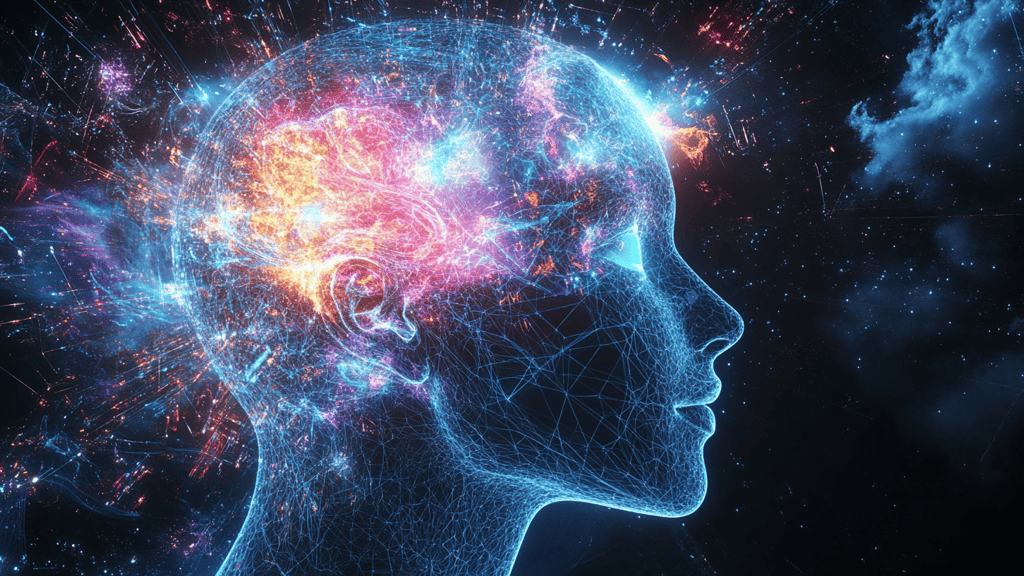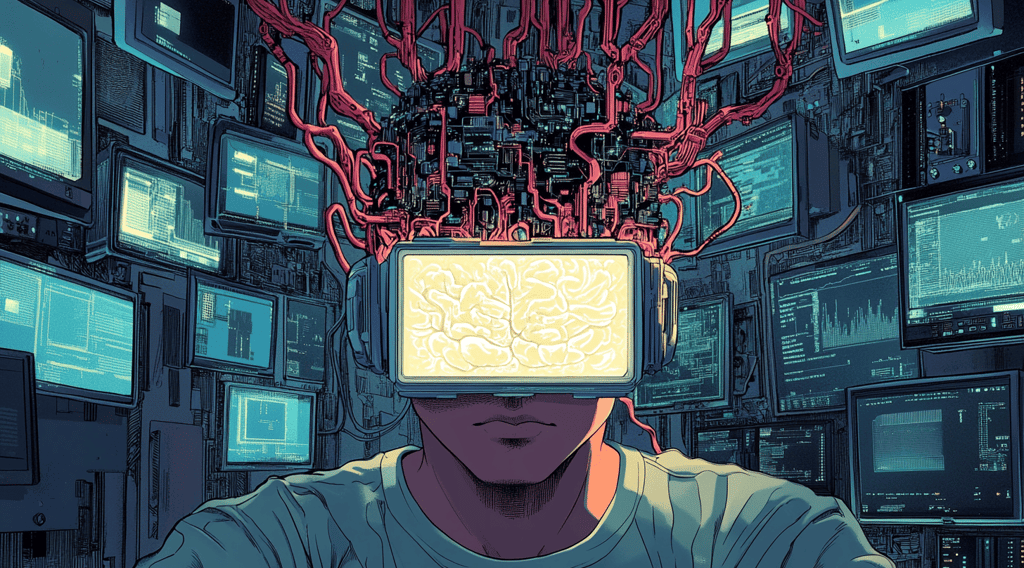The Future of Cyberpsychology — What's Next for the Digital Mind?
MIND & MACHINE


IImagine waking up in 2035. Your neural implant gently stimulates your brain to optimal wakefulness as your smart home system adjusts lighting and temperature based on your biometric data. Your augmented reality glasses activate as you open your eyes, overlaying your physical world with personalized digital information. Before even getting out of bed, you've mentally responded to urgent messages, adjusted your cognitive enhancement settings for the day ahead, and scheduled time in a therapeutic virtual reality session to manage your stress levels.
Science fiction? Not entirely. As the boundaries between humans and technology continue to blur, we stand at the precipice of unprecedented changes to our cognitive and emotional lives. The field of cyberpsychology—once considered a niche specialty—has emerged as perhaps the most critical lens through which we can understand the evolution of the human mind in the digital age.
The Digital Transformation of Human Experience
Cyberpsychology has evolved from studying basic human-computer interactions to examining profound questions about consciousness, identity, and the fundamental nature of human experience. As we integrate increasingly sophisticated technologies into our lives, one question becomes central: How will advancing technology reshape the human mind, and what role will cyberpsychology play in understanding this transformation?
The answer will determine not just the future of psychological science, but potentially the future of humanity itself.


Emerging Technologies and Their Psychological Implications
Virtual Reality (VR) and Augmented Reality (AR): Reshaping Perception and Experience
VR and AR technologies are rapidly advancing beyond entertainment applications into tools that fundamentally alter how we perceive and interact with reality. Current research already demonstrates that immersive environments can produce genuine psychological and physiological responses, blurring the line between virtual and physical experiences.
Research from Stanford University's Virtual Human Interaction Lab suggests that our neural architecture doesn't inherently distinguish between compelling virtual experiences and physical ones. When virtual environments are designed with sufficient realism and immersion, they can activate identical neural pathways as their real-world counterparts.
The therapeutic applications are particularly promising. Exposure therapy for phobias and PTSD shows efficacy rates in VR environments comparable to real-world treatment, with the added benefits of safety, control, and accessibility. Educational applications demonstrate improved retention and engagement compared to traditional learning methods.
However, the psychological implications extend beyond targeted applications. As VR and AR become integrated into daily life, questions arise about the consequences of splitting attention between physical and digital realities. Early research indicates potential impacts on:
Spatial cognition and navigational abilities: Will over-reliance on AR navigation systems atrophy our natural wayfinding abilities?
Social presence and authenticity: How do relationships formed in virtual spaces differ from physical ones, and what happens when the boundaries blur?
Reality testing: Will continuous AR integration challenge our ability to distinguish between physical and digital stimuli?
Researchers at institutions like MIT have only begun to understand the cognitive and perceptual adaptations that might emerge from prolonged immersion in mixed reality environments. While the human brain demonstrates remarkable plasticity and will likely adapt to these new environmental conditions, whether these adaptations will ultimately benefit human flourishing remains an open scientific question.
Brain-Computer Interfaces (BCIs): The Final Frontier
If AR and VR represent the merging of physical and digital realities, brain-computer interfaces represent the ultimate technological integration—direct communication between human neural systems and machines.
Companies like Neuralink are developing implantable brain-machine interfaces with the ambitious goal of achieving "symbiosis with artificial intelligence." While current BCI applications focus primarily on medical uses—helping paralyzed individuals control prosthetics or restoring communication for those with locked-in syndrome—the long-term vision includes cognitive enhancement and direct neural access to information.
The psychological implications are profound:
Cognitive offloading and enhancement: What happens when memory, calculation, and other cognitive functions can be seamlessly augmented by external systems?
Neural privacy: How will the concept of "private thoughts" evolve when brain activity can potentially be monitored, recorded, or even influenced?
Identity and agency: If thoughts and actions can be technologically mediated, how do we define the boundaries of the self?
Neuroscientists involved in initiatives focused on neural rights emphasize that this unprecedented technological frontier requires establishing fundamental protections for cognitive liberty, mental privacy, and personal identity before these technologies become widespread in society.
Digital Consciousness and AI Integration
Perhaps the most speculative—yet increasingly relevant—area of cyberpsychological inquiry concerns the nature of consciousness itself. As artificial intelligence systems grow more sophisticated, questions about machine consciousness and the psychological effects of human-AI relationships become more pressing.
While true artificial consciousness remains theoretical, AI systems increasingly simulate aspects of human-like cognition and emotion. Virtual companions, digital therapists, and AI relationships raise complex psychological questions:
Emotional attachment to non-conscious entities: What are the psychological implications of forming emotional bonds with entities that simulate, but do not experience, emotional states?
Anthropomorphism and projection: How do humans project consciousness and intention onto AI systems, and what are the consequences?
The uncanny valley effect: How do we respond to entities that appear almost, but not quite, human?
Researchers studying human-computer interaction have observed that humans have a psychological predisposition to attribute understanding and intention to entities that appear to comprehend us, regardless of whether actual comprehension exists. This raises fundamental questions not about machine capabilities but about human psychology and our tendency to perceive consciousness in increasingly sophisticated technological systems.


Predictions: How Technology Will Continue to Shape Human Psychology
Cognitive Changes in the Digital Age
Research already reveals significant adaptations in human cognition resulting from digital technology use. Attention spans, memory processes, and information processing strategies all show evidence of modification in response to digital environments.
Attention and Focus
The fragmented attention patterns associated with multi-device use and notification culture have been well-documented. However, future technologies may produce more complex cognitive adaptations:
Augmented cognition: Technologies that monitor cognitive states and adjust information flow accordingly may help manage information overload.
Selective attention enhancement: Tools specifically designed to strengthen attentional control may emerge as counterbalances to digital distraction.
Cognitive filtering: As information volume increases, psychological mechanisms for filtering relevant from irrelevant information will become increasingly sophisticated—possibly with technological assistance.
Attention researchers suggest that rather than viewing technology as inherently harmful to attention, we're likely to develop more sophisticated relationships with digital tools, gaining greater awareness of how different technologies influence our cognitive states and learning to calibrate our usage accordingly.
Memory and Knowledge
Digital memory augmentation has already transformed how humans store and retrieve information. This trend will likely accelerate with several implications:
Transactive memory expansion: Our reliance on external knowledge systems will grow, potentially changing how we encode and retrieve personal memories.
Experiential memory enhancement: Technologies that capture experiences from first-person perspectives may introduce new forms of autobiographical memory and remembering.
Knowledge integration: The challenge may shift from accessing information to integrating it into coherent mental models and wisdom.
Memory researchers note that the fundamental distinction between internal remembering and external knowing may become increasingly blurred. The critical skill may shift from internal storage to efficient integration and utilization of externally stored knowledge resources.
Emotional and Social Dynamics
Perhaps the most significant psychological impacts of technology will be in the realm of emotional experience and social relationships.
Digital Relationships and Social Cognition
As social interactions increasingly span physical and virtual spaces, several trends may emerge:
Expanded social networks with decreased intimacy: The ability to maintain larger numbers of connections may come at the cost of depth.
Empathy adaptation: Research suggests possible reductions in empathic accuracy from text-based communication, but enhanced empathy through perspective-taking in immersive environments.
Relationship fluidity: The boundaries between different relationship types (romantic, platonic, professional) may become more fluid as people navigate multiple contextual identities.
Emotion researchers express cautious optimism that while earlier social media technologies showed concerning effects on psychological well-being, newer immersive technologies might actually enhance meaningful social connection by facilitating richer emotional expression than was possible through primarily text-based platforms.
The Emotions of Human-Machine Interaction
As AI becomes more integrated into social fabrics, new emotional dynamics will emerge:
AI companionship: Systems designed as companions may address loneliness but raise questions about the authenticity of such connections.
Emotional offloading: The use of AI for emotional support may reduce human-to-human disclosure.
Algorithmic emotional influence: As systems become more adept at predicting and influencing emotional states, questions of emotional autonomy arise.
Anthropologists studying human-machine interaction suggest that the central question isn't whether AI can truly replicate human emotional connection, but rather how regular interaction with emotion-sensing machines will fundamentally reshape our expectations for emotional exchange in human relationships.


The Evolution of Self-Identity
Perhaps the most profound psychological transformation concerns how humans conceptualize the self in increasingly technologically-mediated environments.
Digital Identity and the Extended Self
As people exist across physical and virtual contexts, identity becomes more complex:
Identity multiplicity: The management of multiple contextual selves across different platforms and environments may become normalized.
Avatar psychology: The relationship between physical self and digital representations may influence self-perception and behavior.
Identity verification: Questions about authenticity and verification of identity will gain importance as deep fakes and AI-generated content proliferate.
Researchers studying virtual identity suggest that traditional concepts of a single, stable identity may become increasingly outdated. What might emerge instead is a more fluid understanding of self that encompasses multiple contexts, representations, and expressions across digital and physical domains.
Cognitive Enhancement and Human Potential
As technologies for cognitive and emotional enhancement develop, fundamental questions about human potential arise:
Enhancement ethics: Should cognitive enhancement be regulated, and if so, how?
Cognitive diversity: Will enhancement technologies increase or decrease cognitive diversity in human populations?
Authenticity of achievement: How will we understand accomplishment in a world of technologically enhanced capabilities?


The Vital Role of Cyberpsychology in Our Digital Future
Why Cyberpsychology Matters Now More Than Ever
As technology increasingly shapes human experience, cyberpsychology emerges as a critical discipline bridging multiple fields:
Interdisciplinary insights: Combining psychology, neuroscience, computer science, philosophy, and ethics creates a comprehensive understanding impossible within siloed approaches.
Preventive perspective: Anticipating psychological impacts before technologies are widely deployed helps mitigate potential harms.
Human-centered design: Psychological insights ensure technologies develop in ways that support rather than undermine human well-being.
Leading cyberpsychology researchers emphasize the need to elevate the field from a subspecialty to a core component of both psychological education and technology development. With such profound implications for human well-being, psychological considerations must be central to technological innovation rather than an afterthought.
Policy Implications and Ethical Considerations
Cyberpsychological research will increasingly inform critical policy decisions:
Digital well-being guidelines: Evidence-based standards for healthy technology use across the lifespan.
Neuroethical frameworks: Regulations for technologies that directly interface with neural systems.
AI ethics: Psychological insights that inform responsible AI development with human well-being at the center.
Digital rights: Protection of mental privacy, cognitive liberty, and identity security.


Looking Ahead: The Co-Evolution of Mind and Machine
The relationship between human psychology and technology will not be unidirectional. Rather than technology simply shaping human psychology, we will likely see a co-evolutionary process:
Psychological adaptation: Humans will develop new cognitive strategies and social norms in response to technological environments.
Technology adaptation: Technologies will increasingly be designed to accommodate human psychological needs and limitations.
Intentional development: With proper research and foresight, this co-evolution can be guided toward enhancing rather than diminishing human potential.
Technology researchers focusing on human-computer interaction remind us that technology doesn't simply happen to us—we create it, shape it, and integrate it into our lives. The challenge becomes ensuring we do so with full awareness of its psychological impacts and implications.


Conclusion: Redefining Humanity in the Digital Age
As we look toward a future of accelerating technological change, cyberpsychology offers not just a framework for understanding the impacts of technology on human psychology, but a lens through which we can examine what it means to be human in an increasingly digital world.
The questions facing the field extend beyond academic inquiry into the realm of our collective future: Will we use technology to enhance our uniquely human capabilities for creativity, connection, and compassion? Or will we allow technological development to erode these essential qualities? Will we maintain agency over our cognitive and emotional lives, or cede control to algorithms and automated systems? Will we design technologies that respect the diversity of human psychological needs, or create environments that demand psychological conformity?
The answers depend largely on our collective willingness to center human psychological well-being in technological development. By bringing together insights from psychology, neuroscience, philosophy, and computer science, cyberpsychology stands at the vital intersection where these crucial decisions will be made.
As technology continues to advance, perhaps the most important question isn't whether our minds will adapt—they inevitably will—but whether we will thoughtfully guide this adaptation toward an expanded vision of human flourishing, or allow it to be shaped primarily by commercial and efficiency-driven imperatives.
The future of cyberpsychology, and by extension the future of the human mind in the digital age, remains unwritten. The decisions we make today about research priorities, ethical frameworks, and technology design will determine whether digital technologies enhance or diminish what makes us fundamentally human.
